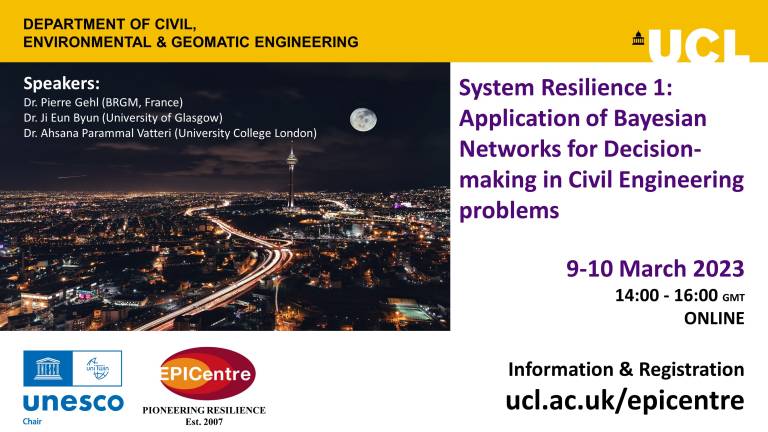System Resilience: Application of Bayesian Networks for Decision-making in Civil Eng. problems
19 February 2023
In this two-days webinar organized by the UNESCO Chair in DRR&RE at UCL, the presenters discuss about the application of Bayesian networks for civil engineering problems, for the assessment of system resilience under natural hazards.

This is a 2-day course on the application of Bayesian networks for civil engineering problems, for the assessment of system resilience under natural hazards. Bayesian networks are efficient tools for probabilistic modelling of systems to capture their behaviour under external influences, in the form of directed acyclic graphs. This approach can function as a decision-making framework, capable of updating the system performance states with the availability of new information.
The course will introduce the application of Bayesian networks on Day 1, with a focus on civil structures and infrastructure, and familiarise the audience with tools for Bayesian network analysis. A brief hands-on exercise will be facilitated as part of the course, which is intended to encourage potential Bayesian network modelling for research and industry problems. On Day 2, a number of case studies were this approach has been successfully applied to multi-hazard situations and large-scale system will be presented. A panel discussion will be followed where invited experts in the field will join to comment on the aspects of general applicability, advantages and limitations of Bayesian network applications. The audience are encouraged to participate in discussions and Q&A throughout the course, especially in the second half of the panel discussion.
Webinar schedule
Day 1: 09 March 2023 | |||
Start time | End time | Session | Presenter |
14:00 | 14:15 | UNESCO Chair Introduction | Prof. Dina D’Ayala |
14:15 | 14:40 | Introduction to Probabilistic modelling and Bayesian networks | Dr. Pierre Gehl |
14:40 | 14:55 | Examples of applications | Dr. Ahsana Parammal Vatteri |
14:55 | 15:00 | Break |
|
15:00 | 15:45 | Tools for Bayesian network analysis | Dr. Ji Eun Byun |
15:45 | 16:00 | Introduction to hands-on example and Q&A |
|
Day 2: 10 March 2023 | |||
14:00 | 14:15 | Discussion on the exercise problem |
|
14:15 | 14:35 | Case study 1: Hazard vulnerability of bridge systems | Dr. Pierre Gehl |
14:35 | 14:55 | Case study 2: Multi-hazard vulnerability of school systems | Dr. Ahsana Parammal Vatteri |
14:55 | 15:15 | Case study 3: Handling large scale systems | Dr. Ji Eun Byun |
15:15 | 15:40 | Panel discussion with invited specialists. | Prof. Daniel Straub, Dr Enrico Tubaldi, Dr. Emin Mentese and Dr. Dexter Lo |
15:40 | 15:55 | Extended discussion with the participants and Q&A | All |
15:55 | 16:00 | Closure | Prof. Dina D’Ayala |
About the Speakers
Prof. Dina D'Ayala

Dina D’Ayala is the UNESCO Chair in Disaster Risk Reduction and Resilience Engineering at University College London and a Professor of Structural Engineering within the Department of Civil, Environmental and Geomatic Engineering. She is the head of Civil Engineering and Co-Director of the Earthquake and People Interaction Centre, EPICentre. She is a director of the International Association of Earthquake Engineering (IAEE) and a Fellow of the Institution of Civil Engineers (ICE). Her specialism is Structural Resilience Engineering with particular emphasis on the assessment, strengthening, preservation and resilience of existing buildings, structures, transport infrastructure and cultural heritage. She is the chief scientist of the Global Program for Safer Schools (GPSS) of World Bank.
Dr. Pierre Gehl

Dr. Pierre Gehl works as an earthquake engineering expert at BRGM (French Geological Survey), where he mostly develops research activities on systemic risk and risk to critical infrastructure. A graduate of Ecole Centrale Paris with a master’s in Environmental Sciences (2005), Dr. Gehl has completed his PhD in Civil Engineering at University College London (UK, 2016), on the multi-risk vulnerability assessment of road infrastructure, as part of the FP7 INFRARISK project (2013-2016 – www.infrarisk-fp7.eu).
His current work at BRGM covers the development of innovative methods for systemic risk and resilience analyses, including the physical and functional reliability assessment of exposed assets and the application of state-of-the-art probabilistic tools (e.g., Bayesian Networks). Dr. Gehl was the BRGM coordinator for FP7 project SYNER-G (2009-2013 – www.vce.at/SYNER-G), a pioneering project on the seismic systemic vulnerability in Europe, where he was involved in the development of a toolbox for the simulation of systemic risk scenarios. More recently, he was Work Package leader for Horizon Europe project TURNkey (2019-2022 – www.earthquake-turnkey.eu), which led to the application of Bayesian updating tools for the integration of field information into predictive models for the near-real time estimation of earthquake damage and losses.
Dr. Ji Eun Byun

Dr. Ji-Eun Byun is a lecturer at the Division of Infrastructure&Environment, University of Glasgow, UK. Her research focuses on reliability analysis and reliability-based optimisation of structural and infrastructure systems against extreme events such as natural/human-made hazards and structural deteriorations. She is particularly interested in analysing complex and large-scale systems including transportation networks, utility distribution systems and structural systems, for which her research endeavors to address high-dimensional probability distributions.
Amongst multiple reliability methods her research has investigated, her research significantly delved into probabilistic graphical models whose visualisation facilitates modelling complicated dependency between different types of variables. In particular, she developed a new Bayesian network (BN) method, namely matrix-based Bayesian network (MBN), which is an alternative data structure that enables BN to handle large-scale systems (toolkit available at https://github.com/jieunbyun/BNS-JT).
Dr. Ahsana Parammal Vatteri

Ahsana is a post-doctoral research fellow within the UNESCO Chair at UCL, working on probabilistic modelling of integrated school-road systems to improve the disaster resilience and reduce education disruption. She completed her PhD at UCL EPICentre in 2022, on multi-hazard vulnerability assessment of school systems using Bayesian networks, where she used numerical and probabilistic tools to study combined flood and seismic resilience of school infrastructure. Previously, she worked on seismic safety assessment of schools as a research consultant at UCL. Ahsana completed her bachelor's and master's degrees in India, where she also worked as a civil engineer. linkedin.com/in/ahsana-parammal-vatteri-ab549a92
Links
 Close
Close

